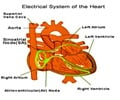High levels of the ALDH2 enzyme could stem the damage caused by lack of oxygen consequent on heart attack.
High levels of ALDH2 enzyme could stem the damage caused by lack of oxygen consequent on heart attack. And this enzyme could come in handy during bypass surgery.
Boosting levels of the ALDH2 enzyme before initiating a heart attack in mice experiments cut the amount of dead heart tissue by 60%, a study published in the Science journal said.ALDH2 is usually involved in breaking down alcohol in the body.
During a heart attack, a clot blocks blood flow to the heart.
The lack of oxygen and build up of toxins causes tissue to die.
This is also a danger during coronary bypass surgery, when blood flow is redirected to allow surgeons to operate.
Once the researchers worked out that ALDH2 seemed to reduce damage to heart tissue they screened a variety of molecules which would increase its production.
Advertisement
It is thought the protective effect is due to the removal of cell-damaging molecules, known as free-radicals, by ALDH2.
Advertisement
Nitroglycerin, a drug given to widen arteries and improve blood flow in people with chest pain, is converted to its active form by ALDH2 but prolonged use of the nitroglycerin can reduce the presence of the enzyme, potentially increasing damage to the heart, BBC reported.
The Alda-1 molecule was able to keep enzyme levels high during nitroglycerin treatment reducing the amount of damage.
This would be particularly important in patients from East Asia who have a mutation in the ALDH2 enzyme, making it less efficient the researchers said.
"Although this enzyme was discovered a long time ago, my research group knew nothing about it except that it helps remove alcohol when people drink," said study leader Dr Daria Mochly-Rosen, a researcher at Stanford University Medical Center.
"We've found a totally new pathway for reducing the damage caused by free-radicals, such as the damage that happens during a heart attack."
Judy O'Sullivan, a cardiac nurse at the British Heart Foundation, said the "interesting finding" could potentially be of great benefit to patients.
"However, it will take many years before this could be confirmed in humans and then several more years before it would lead to the development of drug treatment to be used in clinical practice."
Source-Medindia
GPL













